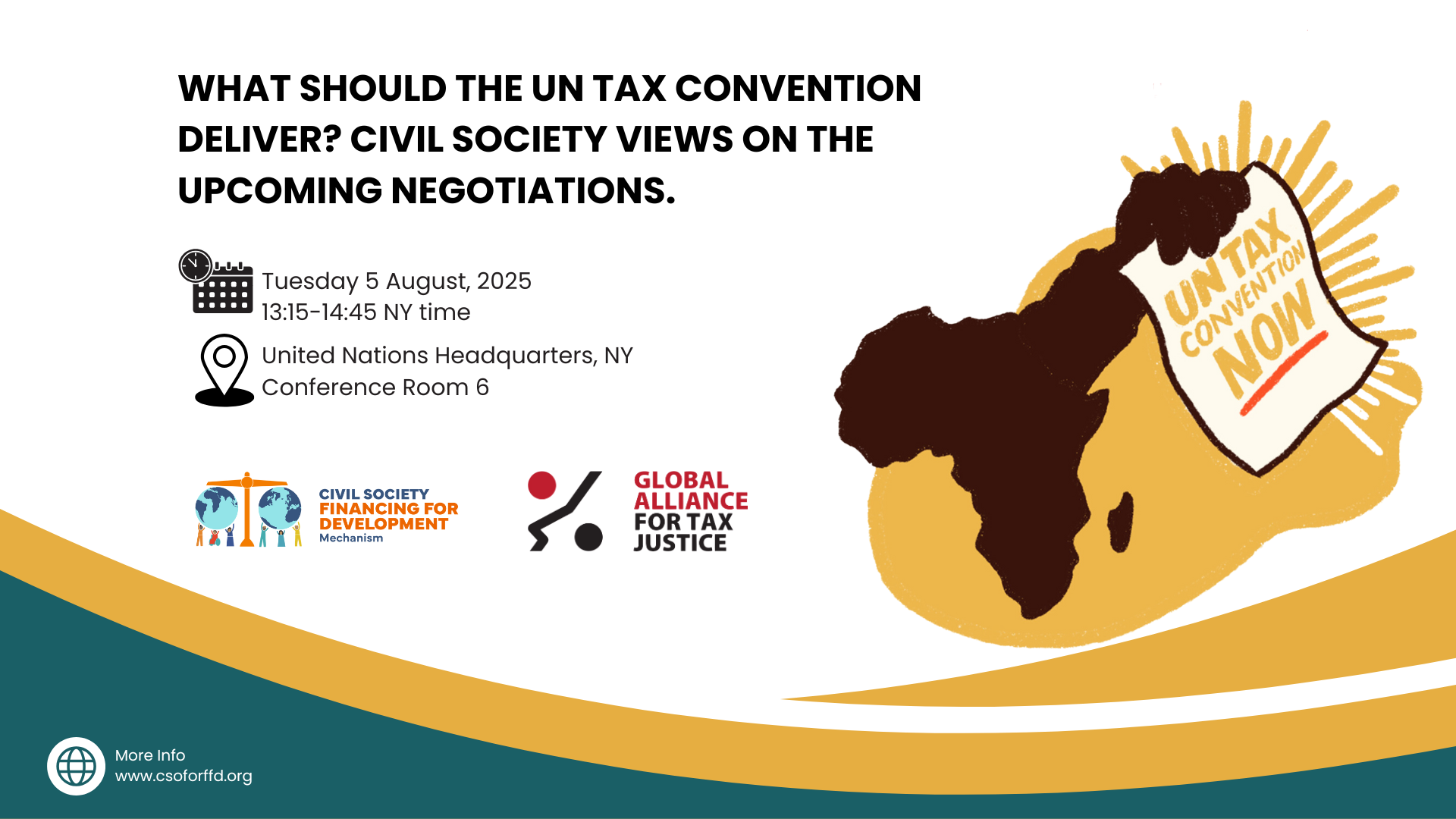
Press Release: A Step Forward in the UN Tax Convention Negotiations
The second session of negotiations to finalise the Terms of Reference (ToR) for a United Nations Framework Convention on International Tax Cooperation (UN Tax Convention) is ongoing at the UN Headquarters in NYC. The negotiations started July 29th and will conclude this Friday, August 16th. On Sunday, the Ad Hoc Committee released the revised draft text which contains many elements urgently needed to deliver on international tax justice.

(Read the original post here: https://globaltaxjustice.org/news/press-release-a-step-forward-in-the-un-tax-convention-negotiations/)
New York City, 12 August 2024 – The second session of negotiations to finalise the Terms of Reference (ToR) for a United Nations Framework Convention on International Tax Cooperation (UN Tax Convention) is ongoing at the UN Headquarters in NYC. The negotiations started July 29th and will conclude this Friday, August 16th. On Sunday, the Ad Hoc Committee released the revised draft text which contains many elements urgently needed to deliver on international tax justice.
The Global Alliance for Tax Justice (GATJ) has long advocated for the establishment of a global tax body and enthusiastically welcomes this next step in the negotiations. GATJ and it’s regional members from Tax and Fiscal Justice Asia (TAFJA), Tax Justice Europe (TJ-E), Red de Justicia Fiscal de América Latina y el Caribe (RJFALC), and Tax Justice Network Africa (TJNA) are at the negotiations advocating for the creation of an international tax system that is progressive, eliminates inequalities, and delivers on the financing needed for development, public services, and climate action.
In reaction, Dereje Alemayehu, Executive Coordinator of the Global Alliance for Tax Justice (GATJ), said:
“GATJ welcomes the Ad Hoc Committee’s revised draft ToR. The negotiations to finalise the ToR for a UN Tax Convention are a crucial step forward in the fight for tax justice. The current international tax system enables growing inequalities, both within and between countries. The failure of the current global tax architecture causes governments around the world to lose over USD $1 billion in tax revenue everyday to multinational corporations and high-net worth individuals.
The Global Alliance for Tax Justice has long championed the need for a global tax body at the UN. It is only through a UN Tax Convention can we achieve tax justice and attain the financing needed for development and address growing inequalities. Although the Global South is disproportionately impacted by tax abuse, all UN Member States lose in our current global tax system. We need a UN Tax Convention to create an intergovernmental mechanism that is transparent, accountable, and where all countries can stand on equal footing.”
Adrián Falco, Coordinator of the Red de Justicia Fiscal de América Latina y el Caribe (RJFALC), said:
“The UN Tax Convention must address growing inequalities by supporting the effective taxation of the rich. The revised draft ToR for the UN Tax Convention crucially includes a reference to the effective taxation of high-net worth individuals. High-net worth individuals are not paying their fair share, leaving the burden on the poorest who have the least ability to pay. Our regressive tax systems fail to provide the domestic resources needed to finance development or public services. We can no longer allow this injustice. All UN Member States must support progressive tax systems and continue to support the taxation of high-net worth individuals in the UN Tax Convention.”
Tove Maria Ryding, Tax Coordinator at European Network on Debt and Development (Eurodad), and member of the Coordination Committee of GATJ said:
“We continue to see many OECD countries from the Global North dragging their feet or being outright obstructive in the negotiations. This is quite absurd – not least given that all countries have a strong interest in a fair, inclusive, and effective global tax system. It is also important to remember that tax havens are causing huge losses of tax income in the Global North too, and therefore really makes no sense that they are so reluctant to help solve this global problem.”
Everlyn Muendo, Policy Lead for Tax and International Financial Architecture at Tax Justice Network Africa (TJNA) said:
“The UN Tax Convention negotiations began because of the leadership of the African Group. African countries continue to participate in the UN process of establishing a UN Tax Convention with the gravity it deserves. For many African countries, this process is an opportunity to address the historic imbalance of taxing rights between developed and developing countries. At the time when the rules on the allocation of taxing rights were formulated, many countries did not even have independence. The UN Tax Convention negotiations are therefore an opportunity to develop a truly inclusive and effective international tax system.
The negotiations for a UN Tax Convention are not only a tax issue but a development issue. Domestic resources are crucial to finance Africa’s development. We welcome the inclusion of illicit financial flows in the ToR because curbing tax-related illicit financial flows is one key part of attaining sustainable domestic financing. Every step in this process for a UN Tax Convention is incremental towards achieving sustainable development, particularly for African countries.”
Jeannie Manipon, Coordinator of Tax and Fiscal Justice Asia (TAFJA) and member of the Coordination Committee of GATJ said:
“The UN Tax Convention negotiations are an opportunity to align the global tax system with the needs of our planet. The UN Tax Convention ToR must reflect the scale and urgency of our environmental crises. The current incentives in the extractive industry are destructive for people and for our planet. A commitment towards ensuring the fair and effective taxation of extractive industries must be added to the ToR, in line with Resolution 78/230.
One of the objective’s in the revised draft ToR for a UN Tax Convention is to establish an international tax system for sustainable development. The countries which have contributed the least to the environmental crises suffer the worst effects and, due to an unjust and outdated global tax system, have the fewest resources to deliver solutions. To ensure sustainable development, the UN Tax Convention must include the environmental justice principles of Common But Differentiated Responsibilities and the Polluter Pays Principle.”
ENDS
###
Notes to the Editors
Information on the second session, including the zero draft terms of reference, can be found here.
GATJ’s joint submission on the ToR can be found here.
Media Contact
Alexandra Wenzel – Global Communications Coordinator, GATJ – alexandra@globaltaxjustice.org
About the Global Alliance for Tax Justice
The Global Alliance for Tax Justice (GATJ) is a South-led global coalition in the tax justice movement. Together we work for a world where progressive and redistributive tax policies counteract inequalities within and between countries, and generate the public funding needed to ensure essential services and human rights.
Created in 2013, GATJ comprises regional tax justice networks in Asia (Tax & Fiscal Justice Asia), Africa (Tax Justice Network Africa), Latin America (Red de Justicia Fiscal de América Latina y el Caribe), Europe (Tax Justice-Europe) and North America (Canadians for Tax Fairness & FACT Coalition), collectively representing hundreds of organisations.

